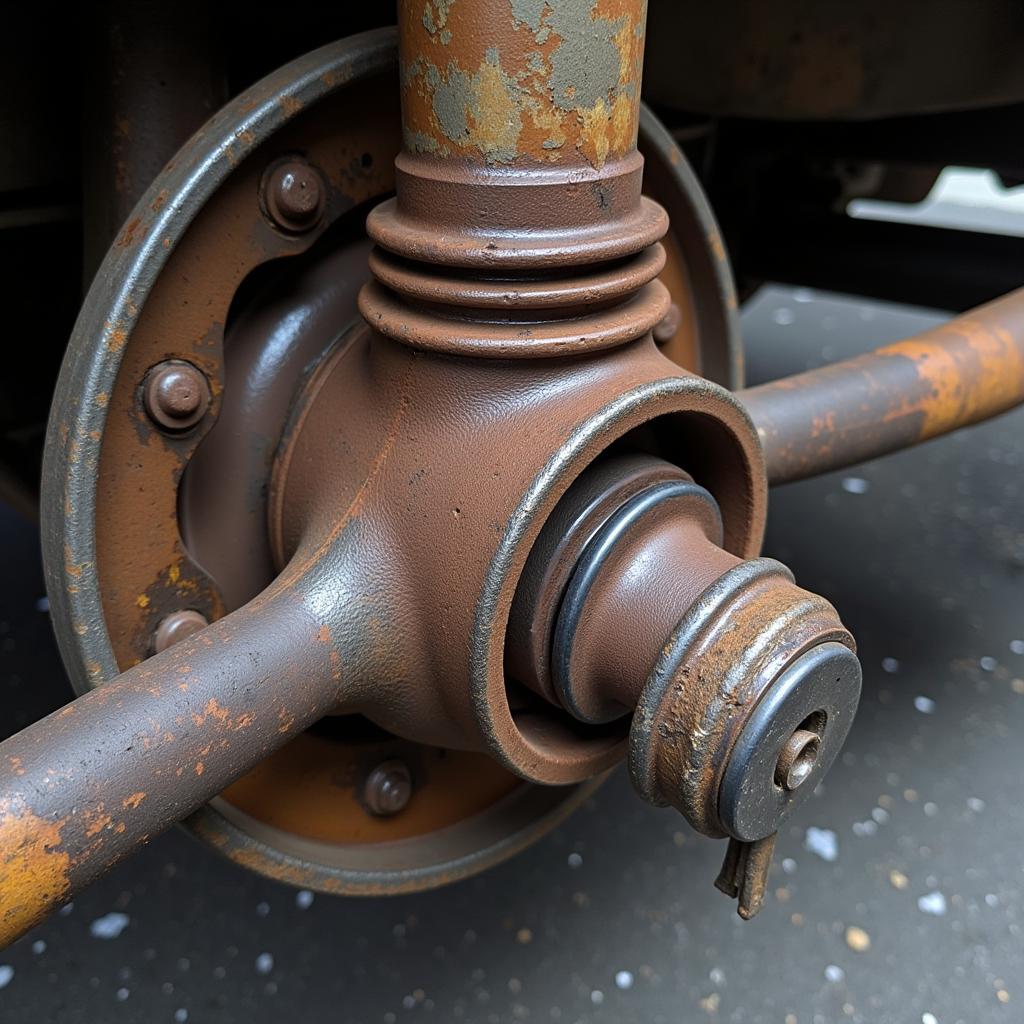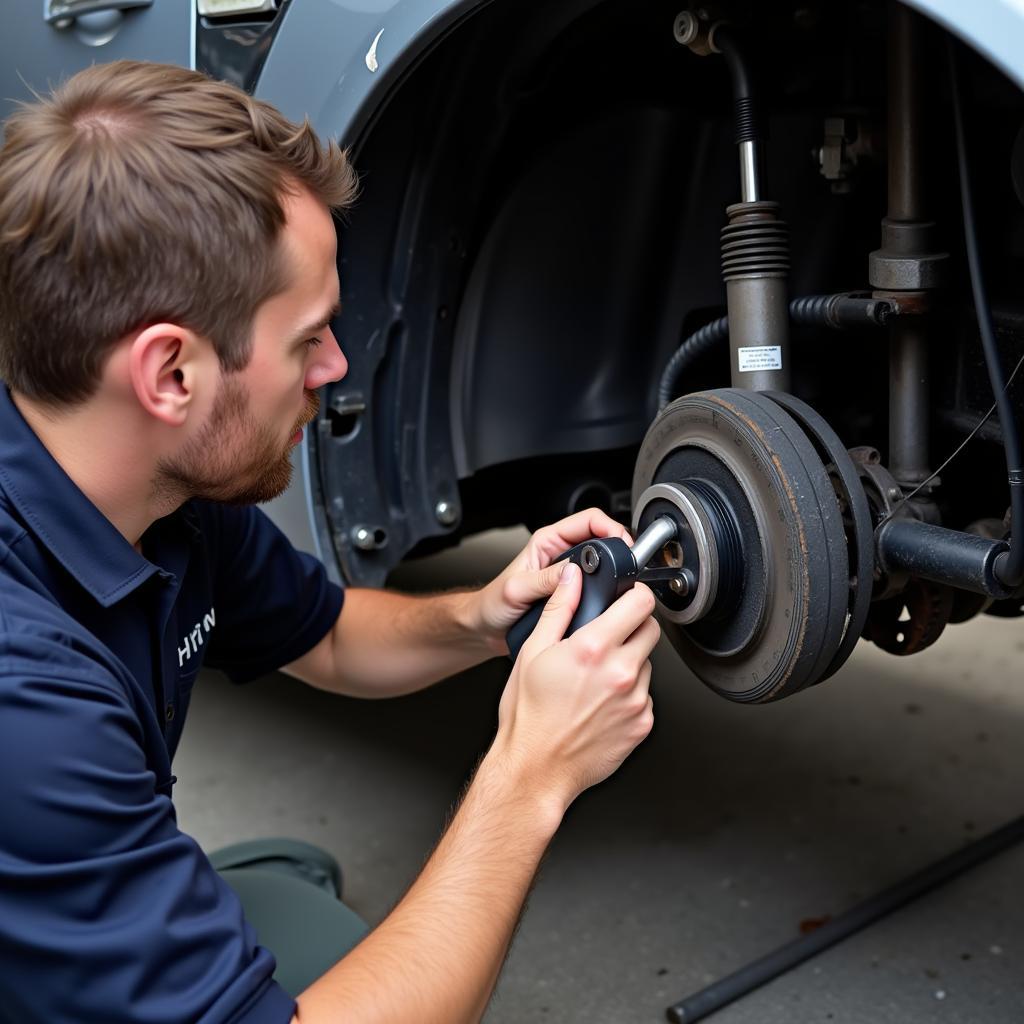If your Car Jerks When Turning, you’re not alone. This common issue can range from a minor annoyance to a serious safety concern. Understanding the underlying causes and knowing how to address them can save you time, money, and potential headaches down the road. Let’s dive into the reasons why your car might be jerking when turning and explore the solutions available.
Common Causes of Jerking While Turning
Several components can contribute to this frustrating problem. Here are some of the most common culprits:
- Low Power Steering Fluid: Power steering fluid is vital for smooth turning. Low fluid levels can cause a jerky or stiff steering wheel, especially when turning at low speeds.
- Worn Power Steering Pump: The power steering pump provides the necessary pressure for assisted steering. A failing pump can lead to inconsistent power delivery, resulting in jerking.
- Damaged CV Joints: Constant velocity (CV) joints allow the wheels to turn while maintaining a constant speed. Worn or damaged CV joints often produce a clicking or popping sound, accompanied by jerking, especially when turning sharply.
- Faulty Tie Rod Ends: Tie rod ends connect the steering rack to the wheels. If they’re worn or loose, they can cause instability and jerking while turning.
- Steering Rack Issues: The steering rack itself can also be the source of the problem. Damage or wear within the rack can cause binding and jerking.
- Wheel Alignment Problems: Improper wheel alignment can cause uneven tire wear and put stress on the steering components, potentially leading to jerking when turning.
- Tire Issues: Uneven tire pressure, worn tires, or tires with different tread patterns can also contribute to jerking sensations during turns.
Diagnosing the Problem
Pinpointing the exact cause of the jerking requires a systematic approach. Start by checking the power steering fluid level. If it’s low, top it off and see if the problem improves. If the jerking persists, a professional mechanic should inspect the other components mentioned above. They’ll have the tools and expertise to diagnose the issue accurately.
Why is it important to address this issue promptly?
Ignoring the problem can lead to further damage and potentially dangerous driving conditions. Addressing it promptly ensures your safety and prevents costly repairs down the line.
 Damaged CV Joint Causing Car to Jerk When Turning
Damaged CV Joint Causing Car to Jerk When Turning
Solutions for Car Jerking When Turning
The solution depends on the underlying cause. Here are some common fixes:
- Power Steering Fluid Top-up: If the fluid level is low, simply adding more fluid might resolve the issue.
- Power Steering Pump Replacement: A faulty pump needs to be replaced to restore proper power steering function.
- CV Joint Replacement: Damaged CV joints require replacement to ensure safe and smooth turning.
- Tie Rod End Replacement: Worn or loose tie rod ends should be replaced to maintain steering stability.
- Steering Rack Repair or Replacement: Depending on the extent of the damage, the steering rack may need to be repaired or replaced.
- Wheel Alignment: Getting a wheel alignment can correct alignment issues and reduce stress on steering components.
- Tire Inspection and Replacement/Rotation: Check tire pressure and inspect for wear. Replace worn tires or ensure all tires have the same tread pattern.
How much does it cost to fix a car that jerks when turning?
The cost varies depending on the specific repair needed. A simple fluid top-up might cost a few dollars, while a steering rack replacement could cost several hundred dollars.
 Mechanic Inspecting Car Steering System for Jerking Issue
Mechanic Inspecting Car Steering System for Jerking Issue
Conclusion
A car that jerks when turning can be a sign of several underlying issues. Addressing the problem promptly is crucial for maintaining safety and preventing further damage. By understanding the potential causes and solutions outlined in this article, you can take the necessary steps to ensure a smooth and safe driving experience. Don’t delay in getting your car checked by a qualified mechanic if the jerking persists.
FAQ
- Can low tire pressure cause jerking when turning? Yes, uneven tire pressure can contribute to this issue.
- Is it safe to drive with a car that jerks when turning? It’s not recommended, as it can be a safety hazard. Get it checked by a mechanic as soon as possible.
- How often should I check my power steering fluid? Check your power steering fluid level regularly, as recommended in your car’s owner’s manual.
- Can I fix a damaged CV joint myself? While possible, it’s a complex repair best left to a professional mechanic.
- How long does it take to replace a power steering pump? The replacement time varies depending on the car model, but it typically takes a few hours.
- What are the signs of a worn tie rod end? Clunking or knocking sounds when turning, uneven tire wear, and a loose steering wheel are potential signs.
- How often should I get a wheel alignment? It’s recommended to get a wheel alignment every 12,000 to 15,000 miles or as needed.
Common Scenarios and Questions
- Scenario: Car jerks only when turning right at low speeds. Possible Cause: Worn right CV joint.
- Scenario: Car jerks and makes a whining noise when turning. Possible Cause: Low power steering fluid or failing power steering pump.
- Scenario: Steering wheel feels loose and car jerks when turning. Possible Cause: Worn tie rod ends.
Related Articles and Further Assistance
For more information on car maintenance and troubleshooting, explore our website for related articles on topics such as steering systems, tire care, and preventative maintenance.
When you need assistance, please contact us at Phone Number: 0902476650, Email: [email protected] Or visit our address: 139 Đ. Võ Văn Kiệt, Hoà Long, Bà Rịa, Bà Rịa – Vũng Tàu, Việt Nam. We have a 24/7 customer service team.





